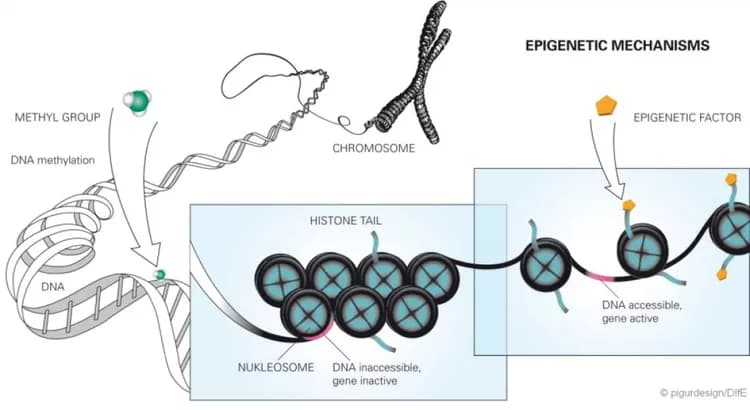As the study shows, a high-fat diet during pregnancy and lactation leads to epigenetic changes in the offspring. These changes affect metabolic pathways regulated by the gut hormone GIP, whereby the adult offspring are more susceptible to obesity and insulin resistance, the precursor to type 2 diabetes. Similar mechanisms cannot be ruled out in humans, according to Pfeiffer.
The lead authors Michael Kruse and Farnaz Keyhani-Nejad recently published the results in collaboration with researchers of Helmholtz Zentrum München in the journal Diabetes.
As scientists throughout the world observe, children of obese mothers have a higher risk of obesity and metabolic disorders. Recent findings suggest that diet-related epigenetic effects may also play a causal role in this. Since humans and mice are genetically very similar, many scientists use mouse models to study such relationships under controlled conditions. Such studies on humans are not possible.
This study focused on the epigenetic effects on the GIP-regulated metabolic pathways that are triggered by the maternal diet during pregnancy and lactation. GIP is a hormone that the gut releases after food intake and which stimulates the secretion of insulin from the pancreas. It influences the metabolism of fat cells and fat oxidation in skeletal muscles and as anabolic hormone promotes the build-up of body mass. These effects are mediated by the GIP via the GIP receptor. If this receptor is lacking as in the Gipr-/- mouse, the hormone can no longer exert its natural effect, and the animals are normally protected from obesity and insulin resistance. Since the Gipr-/- mouse model is well suited for the study of GIP-regulated metabolic pathways, the researchers used this mouse strain for their study. The wild-type strain of the mouse model served as control.
First, the researchers divided the mouse mothers into three groups, who were fed different chow during pregnancy and lactation:
- Group 1: Gipr-/- mice who received a high-fat diet
- Group 2: Gipr-/- mice who received regular chow
- Group 3: Wild-type mice with intact GIP receptor, who received regular chow
After weaning, all offspring of the three groups were fed normal chow for 22 weeks followed by a high-fat diet for an additional 20 weeks.
As the scientists observed, the adult offspring of groups 1 and 3 gained a significant amount of fat mass during the 20-week high-fat diet although they ate less than the offspring of group 2. They also had heightened levels of cholesterol, glucose, and insulin in the blood. In addition, they exhibited increased adipose tissue inflammation and enlarged fat cells and oxidized less fat in their muscles. Furthermore, the researchers found that the activity of different genes was altered in group 1 and 3 in comparison to group 2. These genes play a role in fat oxidation in muscles and in inflammatory processes in adipose tissue or are involved in the regulation of energy consumption by the brain.
"The altered gene activity could partially be traced back to DNA methylation, that is, epigenetic changes," said Pfeiffer. "Our results indicate that the GIP also plays a role in energy consumption, which is controlled by the brain, probably indirectly by reducing the insulin sensitivity of the hypothalamus," the endocrinologist added. This is an entirely new finding. It remains to be seen to what extent these results can be applied to humans. More research on this topic is needed. However, it is clear that diet not only has a direct influence on the individual, but also may affect the offspring.
The above post is reprinted from materials provided by Deutsches Zentrum fuer Diabetesforschung DZD. Note: Materials may be edited for content and length.
Disclaimer: DoveMed is not responsible for the adapted accuracy of news releases posted to DoveMed by contributing universities and institutions.
Primary Resource:
Kruse, M., Keyhani-Nejad, F., Isken, F., Nitz, B., Kretschmer, A., Reischl, E., ... & Pfeiffer, A. F. (2015). A High Fat Diet during Mouse Pregnancy and Lactation targets GIP-regulated Metabolic Pathways in Adult Male Offspring.Diabetes, db150478.
Related Articles
Test Your Knowledge
Asked by users
Related Centers
Related Specialties
Related Physicians
Related Procedures
Related Resources
Join DoveHubs
and connect with fellow professionals


0 Comments
Please log in to post a comment.